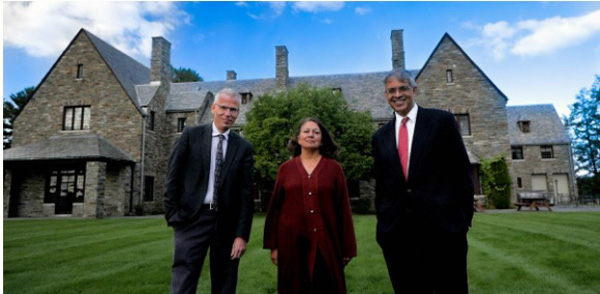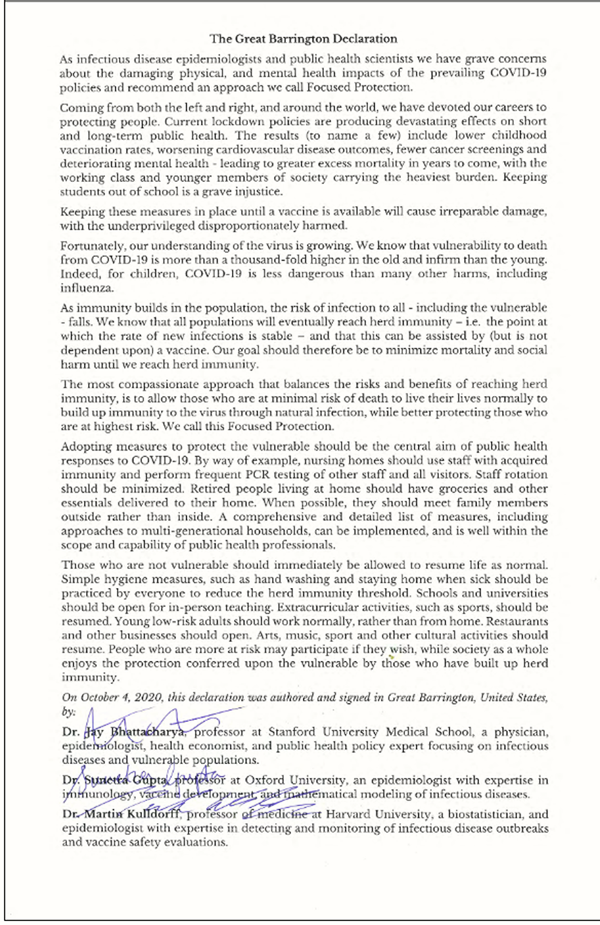Right to Life
 |
 |
 |
 |
 |
 |
 |
AIER Hosts Top Epidemiologists, Authors of
the Great Barrington Declaration
From October 1-4, 2020, the American Institute for Economic Research hosted a remarkable meeting of top epidemiologists, economists, and journalists, to discuss the global emergency created by the unprecedented use of state compulsion in the management of the Covid-19 pandemic. The result is The Great Barrington Declaration, which urges a “Focused Protection” strategy.
After a brief explanation of the strategy, and a discussion of the astonishing costs of lockdown, the Declaration concludes: “Schools and universities should be open for in-person teaching. Extracurricular activities, such as sports, should be resumed. Young low-risk adults should work normally, rather than from home. Restaurants and other businesses should open. Arts, music, sport and other cultural activities should resume.”
The primary authors and signers of the document are: The co-signers include:
The co-signers include:
The American Institute for Economic Research was founded in 1933 in the midst of an economic crisis in the United States. Its purpose was and is to research and promulgate evidence-based solutions to social and economic problems, with a particular focus on the importance of functioning markets. The crisis of the policy response to Covid-19 drew AIER’s close attention from late January 2020 and following. The hosting of this crucial meeting was in the interest of backing the best science, promoting essential human rights, and reviving a focus on the common good.

This article was first published on
American Institute for Economic Research on October 5, 2020

After a brief explanation of the strategy, and a discussion of the astonishing costs of lockdown, the Declaration concludes: “Schools and universities should be open for in-person teaching. Extracurricular activities, such as sports, should be resumed. Young low-risk adults should work normally, rather than from home. Restaurants and other businesses should open. Arts, music, sport and other cultural activities should resume.”
The primary authors and signers of the document are:
- Dr. Martin Kulldorff, Professor, Medicine, Harvard Medical School.
- Dr. Jay Bhattacharya, Professor, Medicine, Stanford University.
- Dr. Sunetra Gupta, Professor, Theoretical Epidemiology, University of Oxford.

From the left, Dr. Martin Kulldorff, Dr. Sunetra Gupta & Dr. Jay Bhattacharya,
in the background, the headquarters of AIER in Great Barrington, MA
- Dr. Rodney Sturdivant, PhD. associate professor of biostatistics at Baylor University and the Director of the Baylor Statistical Consulting Center. He is a Colonel in the US Army (retired) whose research includes a focus on infectious disease spread and diagnosis.
- Dr. Eitan Friedman, MD, PhD. Founder and Director, The Susanne Levy Gertner Oncogenetics Unit, The Danek Gertner Institute of Human Genetics, Chaim Sheba Medical Center and Professor of Medicine, Department of Internal Medicine and Department of Human Genetics and Biochemistry, Tel-Aviv University.
- Dr. Rajiv Bhatia, MD, MPH a physician with the VA health system with expertise in epidemiology, health equity practice, and health impact assessment of public policy. He formerly served as a Deputy Health Officer for San Francisco for 18 years.
- Dr. Michael Levitt, PhD is a biophysicist and a professor of structural biology at Stanford University. Prof. Levitt received the 2013 Nobel Prize in Chemistry for the development of multiscale models for complex chemical systems.
- Dr. Eyal Shahar, MD professor (emeritus) of public health at the University of Arizona, a physician, epidemiologist, with expertise in causal and statistical inference.
- Dr. David Katz, MD, MPH, President of True Health Initiative and the Founder and Former Director of the Yale University Prevention Research Center.
- Dr. Laura Lazzeroni, PhD., professor of psychiatry and behavioral sciences and of biomedical data science at Stanford University Medical School, a biostatistician and data scientist.
- Dr. Simon Thornley, PhD is an epidemiologist at the University of Auckland, New Zealand. He has experience in biostatistics and epidemiological analysis, and has applied these to a range of areas including communicable and non-communicable diseases.
- Dr. Michael Jackson, PhD is an ecologist and research fellow at the University of Canterbury, New Zealand.
- Dr. Jonas Ludvigsson, pediatrician, epidemiologist and professor at Karolinska Institute and senior physician at Örebro University Hospital, Sweden.
- Dr. Sylvia Fogel, autism expert and psychiatrist at Massachusetts General Hospital and instructor at Harvard Medical School, USA.
- Dr. Andrius Kavaliunas, epidemiologist and assistant professor at Karolinska Institute, Sweden.
- Prof. Udi Qimron, Chair, Department of Clinical Microbiology and Immunology, Tel Aviv University.
- Prof. Ariel Munitz, Department of Clinical Microbiology and Immunology, Tel Aviv University.
- Prof. Motti Gerlic, Department of Clinical Microbiology and Immunology, Tel Aviv University.
- Dr. Uri Gavish, an expert in algorithm analysis and a biomedical consultant.
- Prof. Ellen Townsend, Self-Harm Research Group, University of Nottingham, UK.
- Dr. Paul McKeigue, professor of epidemiology in the University of Edinburgh and public health physician, with expertise in statistical modelling of disease.
- Dr. Mario Recker, Associate Professor in Applied Mathematics at the Centre for Mathematics and the Environment, University of Exeter.
- Prof. Mike Hulme, professor of human geography, University of Cambridge.
- Prof. Stephen Bremner, Professor of Medical Statistics, Brighton and Sussex Medical School, University of Sussex.
- Prof. Matthew Ratcliffe, Professor of Philosophy specializing in philosophy of mental health, University of York, UK.
- Prof. Lisa White, Professor of Modelling and Epidemiology Nuffield Department of Medicine, Oxford University, UK.
- Prof. Angus Dalgleish, MD, FRCP, FRACP, FRCPath, FMedSci, Department of Oncology, St. George’s, University of London.
- Dr. Cody Meissner, professor of pediatrics at Tufts University School of Medicine, an expert on vaccine development, efficacy and safety.
- Dr. Helen Colhoun, professor of medical informatics and epidemiology in the University of Edinburgh and public health physician, with expertise in risk prediction.
- Prof. Partha P. Majumder, PhD, FNA, FASc, FNASc, FTWAS National Science Chair, Distinguished Professor and Founder National Institute of Biomedical Genomics, Kalyani Emeritus Professor Indian Statistical Institute, Kolkata.
- Dr. Gabriela Gomes, professor at the University of Strathclyde, Glasgow, a mathematician focussing on population dynamics, evolutionary theory and infectious disease epidemiology.
- Prof. Anthony J Brookes, Department of Genetics & Genome Biology, University of Leicester, UK.
- Prof. Simon Wood, professor at Edinburgh University, a statistician with expertise in statistical methodology, applied statistics and mathematical modelling in biology.
- Prof. David Livermore, Professor at University of East Anglia, a microbiologist with expertise in disease epidemiology, antibiotic resistance and rapid diagnostics.
- Prof. Sucharit Bhakdi, em. Professor of Medical Microbiology, University of Mainz, Germany.
- Prof. Yaz Gulnur Muradoglu, Professor of Finance, Director at Behavioural Finance Working Group, School of Business and Management, Queen Mary University of London.
- Prof. Karol Sikora MA, PhD, MBBChir, FRCP, FRCR, FFPM, Medical Director of Rutherford Health, Oncologist, & Dean of Medicine.
The American Institute for Economic Research was founded in 1933 in the midst of an economic crisis in the United States. Its purpose was and is to research and promulgate evidence-based solutions to social and economic problems, with a particular focus on the importance of functioning markets. The crisis of the policy response to Covid-19 drew AIER’s close attention from late January 2020 and following. The hosting of this crucial meeting was in the interest of backing the best science, promoting essential human rights, and reviving a focus on the common good.

American Institute for Economic Research on October 5, 2020

Posted October 21, 2020
______________________
______________________











